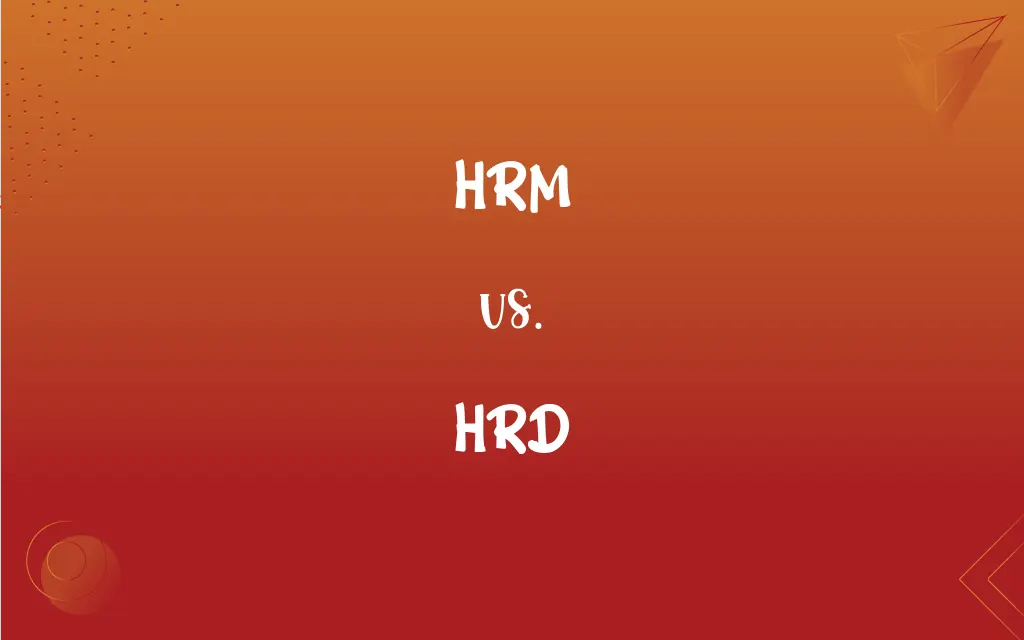HRM vs. HRD: What's the Difference?
Edited by Aimie Carlson || By Harlon Moss || Updated on October 5, 2023
HRM (Human Resource Management) focuses on managing employees and organizational culture, while HRD (Human Resource Development) concentrates on employee development and skill enhancement.

Key Differences
HRM, denoting Human Resource Management, encapsulates a broader framework, governing various facets related to the management of individuals within an organization. On the other side, HRD, translating to Human Resource Development, hones in on the development and training aspect, dedicated to nurturing employees' skills and competencies. While HRM encompasses numerous aspects, including hiring, compensation, and compliance, HRD is securely tethered to evolving and elevating the skills of the workforce.
HRM aims at ensuring that the organization is staffed appropriately, facilitating optimal performance and adherence to all relevant regulations and policies. In contrast, HRD is primarily preoccupied with providing opportunities for learning and development, acting as a subset of the larger HRM domain. The encompassing nature of HRM brings it into every stage of the employee lifecycle, while HRD emerges predominantly in scenarios that involve enhancing employee capabilities.
The role of HRM often extends into realms like employee relations, compliance management, and ensuring a harmonic work environment. In contrast, HRD navigates through employee career paths, dedicating resources and strategies to carve out effective developmental and training programs. HRM finds its utility in managing and optimizing the existing workforce, whereas HRD lays down tracks for skill enhancement and continuous professional development.
A practical, everyday application of HRM might include processes like recruitment, performance management, and attendance tracking. In juxtaposition, HRD might engage in orchestrating training sessions, professional development workshops, and career development initiatives. Both HRM and HRD, while interlinked, diverge in their core objectives and methodologies, each playing a pivotal role in shaping the organizational fabric.
While HRM casts a wider net, encapsulating myriad tasks related to employee management and organizational wellbeing, HRD dives deeper into specific territories, concerned with augmenting employee skill sets and ensuring continuous learning. HRM may handle aspects from hiring to retirement, while HRD continually interweaves, enabling employees to escalate their skills and knowledge throughout their career journey.
ADVERTISEMENT
Comparison Chart
Primary Focus
Managing employees and organizational culture
Developing and enhancing employee skills
Main Activities
Recruitment, performance management, compliance
Training, education, skill development
Objective
Enhance organizational performance
Facilitate employee growth and development
Scope
Encompasses various aspects of employee management
Specifically centered around development
Relation to the Organization
Integral to all employee-related operations
Primarily involved in employee training
ADVERTISEMENT
HRM and HRD Definitions
HRM
HRM plays a crucial role in establishing and maintaining organizational culture and ethics.
HRM strategizes to intertwine individual goals with organizational objectives, promoting a cohesive work environment.
HRD
HRD implements policies that nurture leadership, manage talent, and enhance organizational learning.
Ensuring a pipeline of leadership is a key HRD responsibility, enabling smooth succession and management continuity.
HRM
HRM involves not just hiring, but also developing, retaining, and often, parting ways with employees.
Efficient HRM ensures that organizations maintain a healthy, compliant, and productive work environment.
HRD
HRD focuses on the training, development, and education of employees within an organization.
The HRD team crafted a comprehensive training program to upscale the skills of the sales team.
HRM
HRM serves as a bridge between the organization’s management and its employees, facilitating communication and management.
HRM plays a pivotal role in mediating organizational changes and ensuring smooth implementation at all levels.
HRD
HRD encompasses strategies to enhance and evolve the skills, knowledge, and capabilities of the workforce.
HRD initiatives often align with ensuring employees are well-equipped to meet evolving market demands.
HRM
HRM entails overseeing all aspects related to managing an organization's human resources.
The HRM department is responsible for hiring, developing, and retaining employees in the organization.
HRD
HRD seeks to foster a learning environment, promoting continuous professional development among employees.
A pivotal role of HRD is to facilitate workshops and courses that enhance employee competencies.
HRM
HRM seeks to optimize the performance and satisfaction of employees within an organization.
Through various strategies and policies, HRM aims to align employee performance with organizational goals.
HRD
HRD plays a crucial role in ensuring the alignment of individual skill development with organizational goals.
Through targeted development programs, HRD aids in harmonizing personal career objectives with organizational needs.
FAQs
What is the primary objective of HRM?
HRM aims to efficiently manage, utilize, and develop an organization's human resources.
Is HRD focused more on organizational or individual development?
HRD predominantly focuses on individual employee development, which in turn benefits the organization.
How does HRD ensure that employee development aligns with organizational goals?
HRD carefully curates development programs that simultaneously uplift individual skills and contribute to achieving organizational objectives.
Does HRM engage in employee training and development?
Yes, HRM does involve training and development, often through its subset, HRD.
How does HRD contribute to achieving organizational objectives?
HRD enhances employee skills and knowledge, thereby uplifting their performance and contributing to organizational goals.
How does HRD address the learning needs of employees?
HRD identifies skill gaps and orchestrates training programs to cater to the continual learning needs of employees.
How integral is HRM in managing organizational change?
HRM is pivotal in managing organizational change, ensuring smooth transitions and aiding personnel through alterations.
Does HRD involve competency mapping and management?
Yes, HRD engages in competency mapping to identify, manage, and develop critical skills within the workforce.
How vital is HRM in ensuring legal compliance in organizational operations?
HRM is crucial for ensuring that organizational operations, especially those involving personnel, adhere to legal and ethical standards.
Does HRD contribute to enhancing employee satisfaction?
Yes, by providing development opportunities and career growth, HRD can significantly enhance employee satisfaction.
Does HRD involve leadership development programs?
Yes, HRD often encompasses leadership development as part of its focus on employee growth and skill enhancement.
Can HRD function independently of HRM?
Typically, HRD is considered a component of HRM, focusing specifically on development and training.
In what ways does HRD aid in career progression for employees?
HRD provides training, development programs, and opportunities that facilitate career growth and skill enhancement.
How does HRM deal with conflict resolution within the organization?
HRM employs strategies like mediation, dialogue facilitation, and policy enforcement to manage and resolve conflicts.
How does HRM assist in organizational planning and strategy?
HRM aids in aligning human resources – via hiring, training, and managing – to effectively execute organizational strategies.
In HRM, how significant is the role of performance management?
Performance management is vital in HRM to evaluate, motivate, and enhance employee performance.
Is employee recruitment a part of HRM or HRD?
Employee recruitment is a part of HRM.
Can HRD impact organizational performance and productivity?
Absolutely, by enhancing employee skills and knowledge, HRD indirectly elevates organizational performance and productivity.
Is HRM concerned with employee retention strategies?
Yes, HRM devises and implements strategies aimed at retaining valuable employees within the organization.
How does HRM contribute to shaping organizational culture?
HRM establishes policies, manages personnel, and fosters a work environment that shapes organizational culture.
About Author
Written by
Harlon MossHarlon is a seasoned quality moderator and accomplished content writer for Difference Wiki. An alumnus of the prestigious University of California, he earned his degree in Computer Science. Leveraging his academic background, Harlon brings a meticulous and informed perspective to his work, ensuring content accuracy and excellence.
Edited by
Aimie CarlsonAimie Carlson, holding a master's degree in English literature, is a fervent English language enthusiast. She lends her writing talents to Difference Wiki, a prominent website that specializes in comparisons, offering readers insightful analyses that both captivate and inform.































































